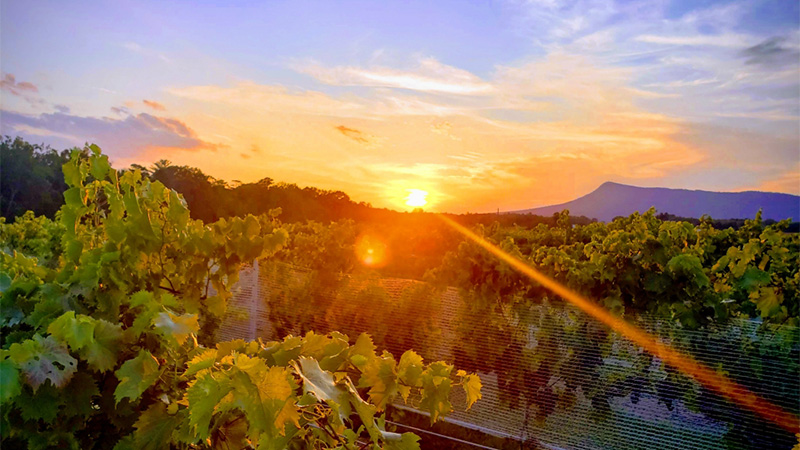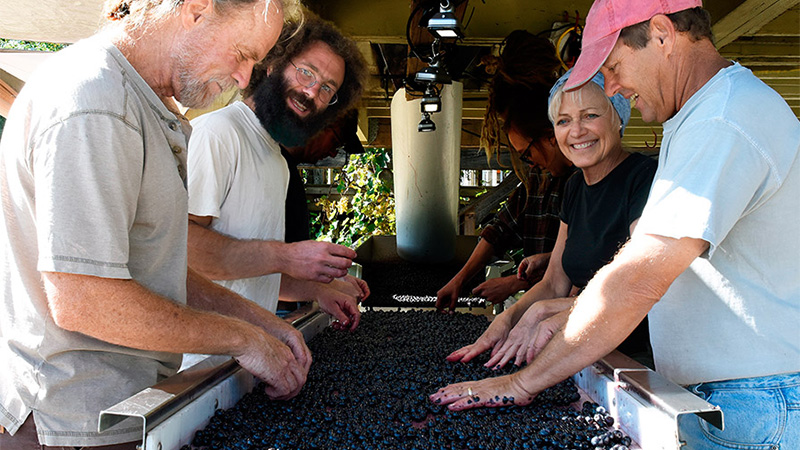This November on VinePair, we’re celebrating everything about American Wine. From up-and-coming regions and our favorite bottles, to the challenges winemakers are facing right now, we’re turning a spotlight on the industry across the United States.
The world is full of emerging wine regions waiting to be discovered — places that have the potential to make lots of good-to-great wines but are still works in progress.
Take Virginia off that list. Like a butterfly broken free of its cocoon, Virginia has fully emerged.
“When we built this winery in 2005, we didn’t realize that the Virginia wine industry would become so prolific so quickly,” says Sean Martin, vice president of Boxwood Winery, as he pours a glass of 2020 Sauvignon Blanc in his winery’s in-the-round tasting room. Sixteen years later, the winery, which sits like an elegant French villa among 27 acres of vines in horse country west of Washington, D.C., already needs expanding.
There are many reasons that Virginia wineries like Boxwood have arrived. Here are eight of them:
Virginia has the right combination — and variety — of climate and soils.
In the middle of the East Coast, Virginia has neither New England’s severe winters nor the South Atlantic’s heat and humidity but instead enjoys a moderate climate similar to that of Western Europe. And while the majority of the state’s more than 300 wineries are located in the Blue Ridge foothills around Charlottesville and a similar area west of the nation’s capital, other wineries such as Ingleside Vineyards and Williamsburg Winery have coastal climates, while Muse Vineyards and Brix & Columns Vineyards — tucked between mountains in the Shenandoah Valley — have continental weather.

As a result, the state can produce a stunning variety of wines. The late Dennis Horton was a pioneer in testing which grapes grew best, planting everything from Viognier to Nebbiolo at his Horton Vineyards in Gordonsville. “I’ve pulled out more vines than most people have planted,” he famously told most visitors who caught him off his tractor.
While the majority of wines are made from grapes identical to those in France’s major wine regions, lesser-known varieties such as Petit Manseng and Vermentino are expanding that repertoire. And though Virginia is making delicious and well-aging Cabernet Francs, “Cabernet Sauvignon has trouble ripening in most places,” says Rachel Stinson Vrooman, co-owner of Stinson Vineyards — a lament widely shared in the state.
There exists a great combination of experience and exuberance.
Jim Law, owner of Linden Vineyards near Front Royal, recently completed his 33rd vintage, having started in 1988 in what he calls “the bucket-and-hose” stage of rudimentary winemaking. Law is one of several Virginian winemakers with considerable expertise, famous for sharing his experience with start-up winemakers.
At the same time, there are young faces — though no less serious than the veteran Law — such as Vrooman. About a dozen years ago, she left a New York City job as a magazine photo editor to join her father, a Washington architect, in starting a family winery in western Albemarle County. “I met my husband Nathan in a winemaking class at the local community college,” she says. Together, they now annually produce around 2,500 cases of wines such as Chardonnay, Cabernet Franc and a Meritage blend and are outgrowing the winery that was once a three-car garage.
The Vroomans have started a family — two girls (perhaps future winemakers?) — and manage not to get into too many production disagreements. “Sometimes, we get into acid fights,” Nathan laughs. He prefers crisper wines; she likes things a little more mellow.
There is a cosmopolitan — even international — atmosphere in Virginia wine country.
The Italian wine family Zonin surprisingly decided in 1976 to produce wine in America — not in California or Oregon, but in Barboursville, naming their winery after the town. Under Luca Paschina’s tutelage, it has grown to be one of the largest in the state and also boasts an elegant restaurant and a small inn.
By contrast, in a bare-bones tasting room located in a rustic setting south of Charlottesville, Michael Shaps offers eponymous Michael Shaps wines that he makes there as well as those from his second winery — in Burgundy.
Many Virginia winemakers have prior experience in other regions, and some wineries hire international consultants to jet in from Europe to give advice. Before it became Trump Winery, Michel Rolland, the Bordeaux consultant who knew what it took to get 100-point Robert Parker ratings, gave viticultural and cellar guidance to then-owner Patricia Kluge.
The terroir is ideal for growing tourism.
Aileen Sevier of Early Mountain Vineyards in Madison points out that well over half the total U.S. population lives within a day’s drive of Virginia wineries. The state’s proximity to Washington, D.C., one of the largest tourist centers in the country, draws added visitors. Tourists seeking attractions other than wineries have Monticello, Colonial Williamsburg, Mount Vernon, Civil War battlefields, and a fascinating air and space museum near Dulles Airport.
Wineries are also destinations for couples wanting to exchange wedding vows in bucolic settings with modern hospitality amenities.
There are plenty of destination wineries.
Small boutique wineries are part of Virginia’s charm, but wealthy owners can attract winemaking talent and build impressive facilities critical to wine tourism. Outside of California, no other American wine region has the wine palaces that Virginia does.
To name a few, Barboursville is backed by the Zonin family, Boxwood is property of the Cooke family that once owned the Washington Football Team, the Steve Case family of AOL fame is behind Early Mountain, Muse is owned by Robert Muse, an international lawyer representing major corporations, and, even though the former president doesn’t drink wine, he owns Trump Winery.

Many wine owners bring with them years of management experience.
For example, David Pollak, owner with his wife Margo of Pollak Vineyards in Greenwood, managed Bouchaine Vineyards in California while still employed at DuPont and his own winery in Virginia while still a top exec at Cintas. Margo was formerly an agency director for the state of Delaware. The couple’s strategy at Pollak is to concentrate on direct-to-consumer sales through a wine club and being a popular wine destination — but doesn’t do weddings.
In addition to her position in the Case family business, Jean Case at Early Mountain also heads the National Geographic Society. Her strategy positions Early Mountain as an event and wedding space — a hospitality center — in addition to wine production.
Key to both successful strategies, however, is to first make great wines.
Distribution is expanding across the U.S.
Virginia Tech offers popular wine-growing courses and extension services, and community colleges have basic courses to train those new to the business. And while wineries make more profit selling directly to consumers at the wineries, through wine clubs, and via online sales, most like to have some distribution in restaurants and stores to maintain their reputations.
Regional and national wine distributors are showing interest. “We sell about one-third of our production through Winebow,” says Sevier. And Paschina of Barboursville says “about 15 percent of what we sell is out-of-state.”
Virginia produces critically acclaimed wines.
As a result, many wineries are now selling bottles at “California prices.” For example, a bottle of “Lost Mountain” red blend from cult winemaker Rutger de Vink at RdV Vineyards in Delaplane goes for $160 — if you can find one. Additionally, the region produces red wines built to age, and those crafted in the 1990s at Linden, Horton, Barboursville, Williamsburg, and Jefferson wineries are still drinking beautifully.
Virginia wineries are also finally catching attention of wine-rating publications. Veritas CEO George Hodson, who also heads the Virginia Wineries Association, says his organization is achieving success in convincing top reviewers to include more Virginia wines in their roundups.
But even though Boxwood wines are well reviewed, Martin says he wants to keep prices reasonable. “After all,” he says, “we’re not just competing against other Virginia wineries. We’re competing for customers with wineries from around the world.”
